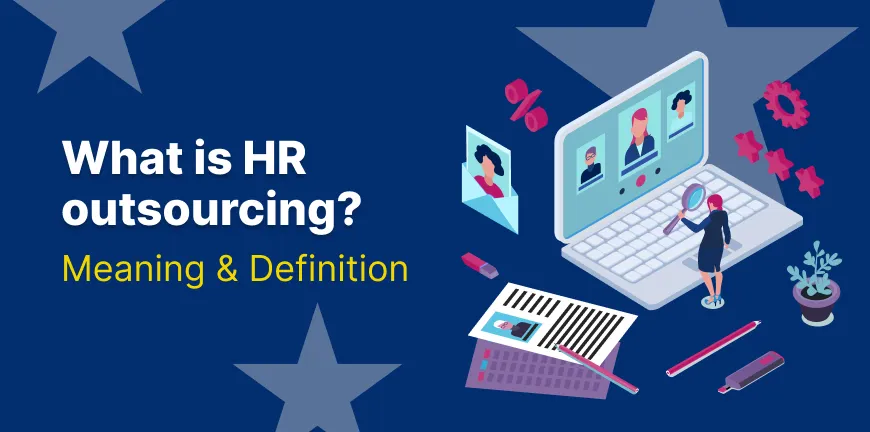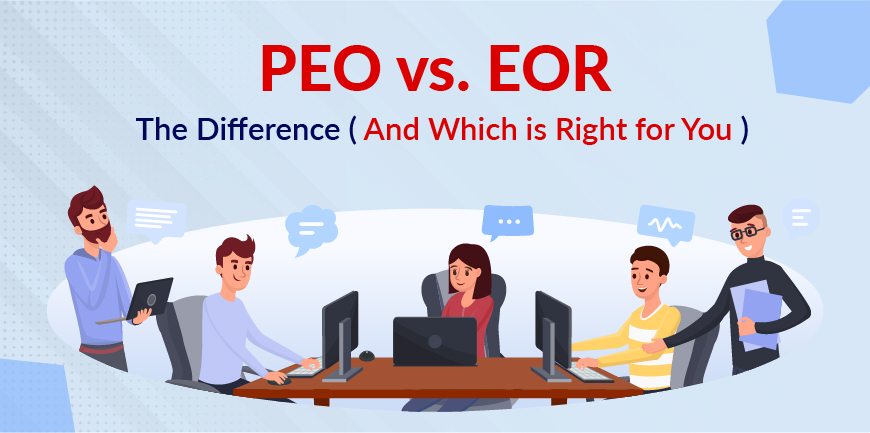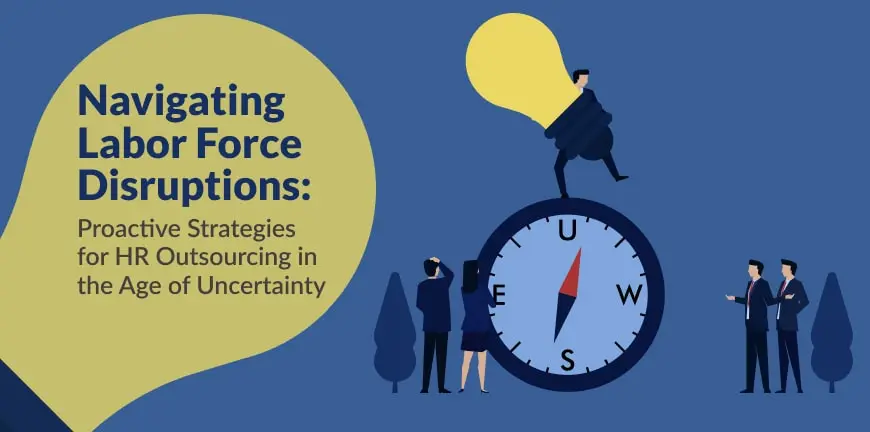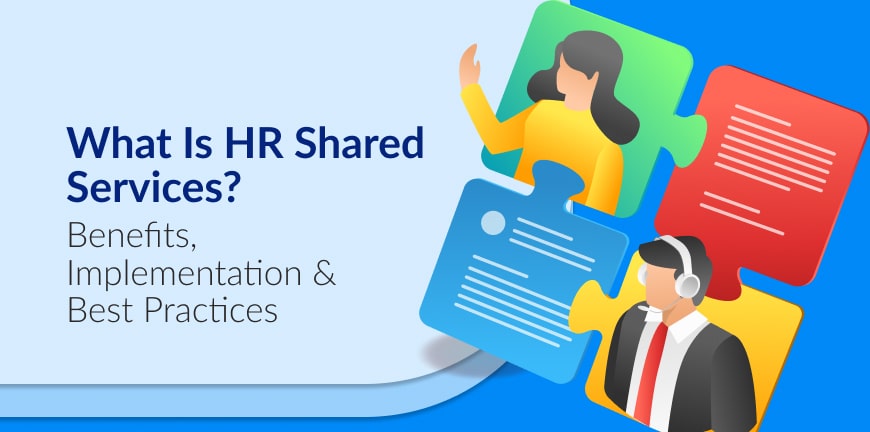
AI and the 2025 Job Market: Sectors and Skills Most Affected
30/09/2025
The Rise of Recruitment Chatbots and 24/7 Candidate Engagement
30/09/2025- What is HR Outsourcing? Meaning & Definition
- Why Do Companies Choose HR Outsourcing?
- What Are the Different Types of HR Outsourcing Models?
- Which HR Services Can Be Outsourced to Experts?
- What Are the Key Benefits of HR Outsourcing for Businesses?
- What Are the Challenges and Risks of HR Outsourcing?
- HR Outsourcing vs In-House HR: What’s the Difference?
- What Are the Latest HR Outsourcing Trends?
- What Is the Future of HR Outsourcing in Indiaa
- Are You Looking for an HR Outsourcing Partner?
- Key Takeaways
- Frequently Asked Questions (FAQs)
“Focus on your core competence and outsource the rest” – Azim Premji, Indian businessman and former chairman of the board of directors of Wipro.
Does your company run the entire business operation in-house, and is now planning to outsource the complete HR function? Or the current payroll team lacks expertise, and you want to hire external expertise to reduce errors and prevent penalties?
Every company is on the quest to reach Fortune 500 status and looks for continuous improvement. To achieve this, the leadership and HR teams must reduce their administrative tasks and focus more on core elements like strategic planning, brand value enhancement, and business expansion.
Instead of adding additional resources and investing in upskilling, it’s wiser to outsource part or the complete HR function to an external service provider that can bring quick results without operational disruptions.
Let’s get an in-depth understanding and gather valuable insights on HR outsourcing from a 360-degree perspective through this comprehensive guide.
What is HR Outsourcing? Meaning & Definition
HR outsourcing is an informed choice for delegating human resource functions to an external service provider, which can boost efficiency, reduce time to hire, improve the quality of hire, maintain compliance, and provide a top-notch employee experience. Deloitte defines HR outsourcing as “Outsourcing HR enables companies to focus on strategic priorities while reducing operational burdens.” Similarly, SHRM reiterates HR outsourcing meaning as “contracting third-party providers to handle HR administrative tasks, payroll, recruitment, and compliance.”
Companies, in most cases, seek the assistance of HR outsourcing when internal teams are struggling with workload or have a shortfall of specialized expertise. For example, a mid-sized IT firm in Greater Bengaluru is expanding rapidly across multiple states and is experiencing difficulties in managing payroll, statutory compliance, & recruitment simultaneously.
By partnering with an HRO provider like Alp Consulting, they were able to automate payroll, ensure compliance with PF, ESIC, & TDS mandates, and streamline hiring, thereby reducing HR workload by 40%.
Industry reports suggest that nearly 37% of Indian companies are leveraging HR outsourcing to scale operations without disruptions. Additionally, HR outsourcing manpower provides cost savings, access to specialized talent, and improved employee satisfaction, making it a strategic choice for growing businesses.
Why Do Companies Choose HR Outsourcing?
Most companies try to manage HR operations in-house, but there comes a time when HR outsourcing becomes inevitable. If a company is on the road to expansion and requires scaling its workforce, then partnering with an HRO can work as a game-changer.
However, certain conditions make it ideal for entering a long-term collaboration with a reputable HRO service provider like Alp Consulting. Here are the top 5 reasons for HR outsourcing:
1. Cost Efficiency
Outsourcing HR reduces overhead costs associated with staffing, technology, & infrastructure. Companies are no longer compelled to maintain large in-house HR teams for administrative tasks.
Suppose a mid-sized manufacturing company in Pune is looking to outsource payroll, benefits, & recruitment support. This move can cut HR operational costs by 25% annually, while maintaining efficiency. As per Deloitte, organizations can bring down HR costs by up to 32% via strategic HR outsourcing.
2. Access to Specialized Expertise
External HR outsourcing manpower providers bring deep knowledge of payroll, statutory compliance, labour laws, & HR technology that internal teams often lack.
For example, a growing IT company in Bangalore faced hardships to comply with PF, ESIC, & TDS regulations across multiple states due to a lack of in-house expertise.
Partnering with an HRO ensured 100% compliance, preventing penalties & surprise audits, making the company more profitable.
3. Focus on Core Business Priorities
With administrative HR tasks handled externally, the leadership team can focus on strategic initiatives like talent development, innovation, & business growth. For example, a retail chain outsourced HR administration, enabling its HR team to concentrate on store expansion, customer engagement programs, & employee engagement initiatives.
4. Scalability for Rapid Growth
Outsourcing supports companies during workforce expansion without the need to quickly onboard or train internal HR teams. Example: A logistics startup scaled from 50 to 500 employees across multiple states by partnering with an outsourced recruitment & HR provider. This optimized hiring, onboarding, & compliance processes.
According to HR outsourcing statistics extracted from top surveys, companies utilizing HR outsourcing report 30–40% faster workforce scaling during periods of rapid growth.
5. Improved Employee Experience and Satisfaction
HR outsourcing ensures timely payroll, benefits administration, & quick resolution of employee queries, boosting overall satisfaction. For instance, a fintech startup outsourced HR services, resulting in faster salary disbursements, transparent leave management, & better benefits communication. According to PwC India, 68% of employees experience higher satisfaction when HR functions are outsourced to reputed service providers.
6. Technology and Analytics Access
Outsourced HR providers bring advanced HR software, cloud platforms, & analytics tools that may necessitate higher investment for companies to implement in-house. Example: A mid-sized IT firm leveraged an HRO’s cloud-based payroll and performance management platform to gain real-time insights, improve reporting accuracy, and optimize HR processes.
7. Risk Mitigation and Compliance Assurance
HR outsourcing reduces legal & compliance risks, as HROs maintain updated knowledge of labour laws, taxes, & regulations. For instance, a multinational company entering the Indian market partnered with an HRO to manage local labour laws and statutory filings, thereby avoiding penalties while speeding up market entry.
What Are the Different Types of HR Outsourcing Models?
HR outsourcing models empower firms to delegate selected human resource functions to external specialists or hand over complete responsibilities from end to end if needed. These HR outsourcing manpower models help reduce costs, boost compliance, & increase efficiency while letting businesses focus on their core objectives. Companies can choose from different models depending on their size, industry, and HR needs.
Here are the 7 most preferred HR outsourcing models available for consideration:
1. Professional Employer Organization (PEO)
A PEO enters a co-employer relationship where they handle payroll, compliance, benefits, & HR administration while the main employer has the final say. This model helps small & mid-sized businesses offer enterprise-level HR services without the need to build a large in-house HR team. As per studies, companies that use PEO services experience a nearly 20% drop in workers’ compensation expenses.
Example: A small SaaS startup partners with a PEO to provide competitive healthcare & retirement benefits. This boosts employee retention & attracts top talent without internal HR overhead.
2. Administrative Services Organization (ASO)
Unlike a PEO, an ASO doesn’t assume the role of a co-employer. It manages administrative HR tasks like payroll processing, benefits administration, & compliance support. This HR outsourcing model suits companies that want expert HR administration but want to exercise full control over employment relationships.
Example: A mid-sized manufacturing company outsources payroll & compliance to an ASO. This partnership reduces errors & penalties while retaining autonomy over hiring & employee management.
3. Human Resources Business Process Outsourcing (HR BPO)
HR BPO providers manage the entire HR function or significant parts of it, including recruitment, payroll, training, & compliance. This HR outsourcing arrangement offers scalability & standardization, especially beneficial for organizations with global operations or multiple business units.
Example: A MNC outsources its HR processes to a BPO partner to streamline cross-border compliance & ensure consistent HR services across diverse regions.
4. Payroll Outsourcing
This model focuses solely on managing payroll processes, tax compliance, & salary disbursements. It reduces administrative burden, ensures timely payments, & minimizes risks associated with complex tax regulations and audit reporting requirements.
Example: A retail chain with seasonal spikes in workforce hires a payroll service provider like Alp Consulting to handle paychecks & compliance, ensuring accuracy during peak business months.
5. Recruitment Process Outsourcing (RPO)
RPO providers manage the hiring process from end-to-end, including candidate sourcing, screening, interviewing, & onboarding. This approach improves hiring efficiency, reduces costs, & helps access specialized talent pools for hard-to-fill roles. According to surveys, nearly 65% organizations across the globe are using RPO services to improve their HR management initiatives.
Example: A healthcare organization uses an RPO partner to quickly hire specialized nurses & medical staff during a talent shortage, reducing time-to-hire significantly.
6. Managed Services Provider (MSP)
MSPs specialize in managing contingent & flexible workforces, which include contractors, freelancers, & temporary staff. They provide vendor management, cost optimization, & compliance assurance for non-permanent employees.
Example: An IT consulting firm leverages an MSP to manage hundreds of freelance developers hired for a major client project, ensuring efficient resource allocation & legal compliance.
7. Shared Services Model
In this model, HR services are centralized via a shared service center and delivered to multiple business units, sometimes in collaboration with outsourcing partners. It increases consistency, reduces duplication, & enhances service quality.
Example: A global bank sets up an HR shared service center in India to handle payroll, employee queries, and compliance for its worldwide workforce, reducing costs & improving efficiency.
Which HR Services Can Be Outsourced to Experts?
Here are 12 key HR services that can be outsourced to a reputable service provider:
1. Payroll Management
Payroll outsourcing manages salary processing, tax deductions, & compliance reporting. This HR function offloads administrative burden, ensures accuracy, & prevents penalties while freeing HR teams to focus on strategic initiatives.
2. Recruitment and Staffing (RPO)
Recruitment outsourcing or RPO manages end-to-end hiring, including job postings, candidate sourcing, screening, and onboarding. This HR component accelerates hiring timelines, improves the quality of hires, and provides access to wider talent pools.
3. Employee Benefits Administration
Employee benefits administration outsourcing allows service providers to effectively manage healthcare, insurance, retirement plans, and other perks. It helps ensure compliance, improves employee satisfaction, & reduces employer costs through expert vendor negotiations & efficient plan administration.
4. Compliance and Risk Management
External HR agencies ensure organizations meet labour laws, salary regulations, & workplace safety standards. Outsourcing this function reduces compliance risks, avoids penalties, & provides timely updates on evolving employment regulations.
5. Training and Development (L&D)
Outsourcing training and development can help companies create superior skill development, leadership programs, & e-learning solutions. It improves workforce performance, fosters continuous learning, & reduces internal resource strain while ensuring employees remain industry-ready.
6. Performance Management
External HR experts will design appraisal systems, feedback mechanisms, & KPIs. They streamline annual reviews, reduce bias, & help align employee goals with business vision for higher engagement & productivity.
7. Employee Onboarding
Onboarding outsourcing ensures smooth integration of new hires with orientation programs, compliance paperwork, & cultural training. It reduces turnover, offers the best first impressions, & speeds up employee readiness.
8. Background Checks and Verification
Third-party agencies handle employee background checks, criminal history, & reference verification. It reduces hiring risks, ensures workforce credibility, & accelerates the recruitment process with professional screening expertise.
9. Compensation and Rewards Management
Outsourcing compensation and rewards management helps design fair pay structures, bonuses, & incentive plans. Also, experts ensure competitiveness in the market while maintaining compliance & motivating employees with well-structured reward systems.
10. HR Analytics and Reporting
Specialized vendors provide workforce analytics, turnover metrics, & productivity reports. This data-driven outsourcing supports strategic decision-making, helps forecast workforce needs, & improves HR planning accuracy.
11. Employee Assistance Programs (EAPs)
Outsourced EAPs offer counseling, stress management, & wellness support. They enhance employee well-being, reduce absenteeism, & promote a healthier workplace culture through professional, confidential services.
12. Contingent Workforce Management (MSP)
HR outsourcing team manages freelancers, contractors, & temporary workers. They ensure cost optimization, compliance, & streamlined vendor management for organizations relying heavily on contingent labour.
What Are the Key Benefits of HR Outsourcing for Businesses?
Here are 5 key benefits of outsourcing HR in the current business landscape:
1. Cost Efficiency
HR outsourcing reduces overhead expenses as it eliminates the need for having stacked in-house HR teams. It helps businesses make significant savings on recruitment, training, & compliance costs while accessing expert services at affordable pricing.
2. Improved Compliance
External HR providers ensure organizations comply with labour laws, tax regulations, & employment policies. This minimizes risks, prevents costly penalties, & keeps businesses updated with changing legal requirements.
3. Access to Expertise
HR outsourcing provides access to specialized HR professionals with industry knowledge, advanced tools, & best practices. Businesses can avail of numerous benefits from expert guidance without needing to hire or train in-house specialists.
4. Scalability and Flexibility
HR outsourcing manpower arrangement allows companies to scale services on demand. They can expand, downsize, or hire seasonally based on project and business needs. This flexibility supports business growth while ensuring HR processes remain efficient & affordable.
5. Enhanced Focus on Core Business
By outsourcing administrative HR tasks, businesses can reduce the workloads of their leadership and internal teams and empower them to focus more on core operations, innovation, and strategy. This boosts competitiveness and overall organizational performance.
What Are the Challenges and Risks of HR Outsourcing?
Here are 5 key challenges and risks of HR outsourcing:
1. Loss of Control
Outsourcing HR functions may diminish managerial oversight on sensitive processes like payroll or recruitment. Additionally, businesses can get disconnected from employee experiences, affecting culture alignment & decision-making transparency.
2. Data Security Concerns
Sharing employee information with third-party vendors poses higher risks of data breaches, identity theft, or misuse. Strong data protection agreements & compliance with privacy laws are critical to mitigate risks.
3. Hidden Costs
While outsourcing is cost-efficient in most parts, unexpected fees for customization, additional services, or vendor transitions can arise from time to time due to unforeseen circumstances. Without clear contracts, businesses risk paying more than estimated, reducing cost-effectiveness.
4. Vendor Dependency
Overreliance on external HR agencies can create dependency, limiting flexibility in handling sudden organizational changes or crunch situations. If vendors underperform, businesses may face disruptions & lack internal expertise to manage transitions.
5. Cultural Misalignment
External HR service providers may not fully understand company culture, values, or employee expectations. This disconnect can affect engagement, communication quality, & alignment of HR practices with organizational goals.
HR Outsourcing vs In-House HR: What’s the Difference?
Here are the key differences between HR Outsourcing and In-house HR
| Aspect | HR Outsourcing | In-House HR | Example |
| Cost Structure | Fixed service fees & scalable costs based on service usage. | Salaries, benefits, & infrastructure for HR staff. | A startup firm saves by outsourcing payroll instead of hiring a full-time payroll manager. |
| Expertise | Access to specialized HR professionals & advanced tools. | Limited to the skills of internal HR staff. | A mid-sized IT firm outsources compliance to experts to prevent penalties and lawsuits. |
| Scalability | Can be easily scaled up/down with business needs. | Requires hiring or layoffs to adjust capacity. | A retail company outsources seasonal hiring instead of expanding HR staff temporarily. |
| Technology Access | Vendors provide modern HR software and analytics platforms. | The company must purchase and maintain systems. | A healthcare company uses vendor HR analytics dashboards without investing in software licenses. |
| Compliance Management | External HR vendors monitor labour law changes & ensure compliance. | Internal HR must stay updated & handle compliance manually. | A manufacturing firm avoids fines by outsourcing compliance to experts. |
| Focus on Core Business | Free leadership from administrative HR tasks. | Leaders spend more time managing HR operations. | A fintech startup outsources HR to focus on product development. |
| Cultural Alignment | Risk of disconnect from company values & employee culture. | Strong alignment with organizational culture. | An outsourcing vendor struggles to understand the unique employee engagement needs of a creative agency. |
| Control & Customization | Limited control over processes, governed by vendor contracts. | Full control over HR strategies, policies, and execution. | A company prefers in-house HR for tailoring engagement programs to its workforce. |
What Are the Latest HR Outsourcing Trends?
Here are the top 5 HR outsourcing trends that companies must be aware of:
1. AI-Driven Recruitment & Automation
HR outsourcing vendors are increasingly deploying AI tools for candidate screening, chatbots, & predictive hiring. As per DemandSage, nearly 87% of companies are now using AI in their recruitment processes.
2. Hyper-personalized Employee Experience
HR outsourcing manpower services emphasize custom onboarding, wellness, & engagement aligned to individual preferences. Nearly 85% of employers are using AI/automation for report generation. This integration will significantly improve efficiency in HR tasks.
3. Data Analytics & Predictive Insights
Outsourcing partners offer dashboards, turnover forecasting, & actionable HR metrics. Companies using outsourced compliance platforms have experienced a nearly 24% reduction in audit findings, according to Insignea Resources.
4. Strategic HR Outsourcing (Beyond Transactional)
Firms are now outsourcing more strategic areas like talent management, upskilling, and culture programs. The HR outsourcing market is expected to grow from USD 42.4 B to USD 68.9 B (2024 to 2032).
5. PEO & Flexible Outsourcing Growth
More businesses are now adopting PEO or hybrid HR outsourcing models, combining in-house & outsourced functions. The global PEO market is projected to grow from USD 73.58 B in 2025 to USD 170.8 B by 2033 (CAGR ~11%).
What Is the Future of HR Outsourcing in Indiaa
India’s HR outsourcing (HRO) sector is poised for strong growth & transformation. According to IMARC, the HRO market was valued at USD 8.6 billion in 2024 & is projected to grow by USD 13.9 billion in 2033 (CAGR of nearly 5.5 %).
Meanwhile, BlueWeave Consulting estimates that the Indian HRO market will grow from USD 94.36 million in 2022 to USD 361.45 million by 2029, at a CAGR of ~25 %.
What’s exciting is how technology is reshaping HR services: AI-driven recruitment, cloud payroll, remote workforce management, and advanced analytics are becoming the norm. SMEs are increasingly outsourcing non-core HR tasks so leadership can focus on innovation. For instance, RPO providers are bundling services with Managed Services and catering to Tier 2 & 3 cities.
With rising talent costs globally, India is likely to remain a preferred destination for reliable, scalable HR outsourcing, especially as providers refine employee experience and compliance offerings. All signs point to a vibrant, opportunity-rich future.
Are You Looking for an HR Outsourcing Partner?
In the current business landscape, there is no room for error, and companies must make continuous improvements to their existing processes to stay competitive and grab every opportunity that comes their way with both hands.
Currently, managing HR functions in-house for companies regardless of size has become nearly impossible due to fast delivery expectations from all aspects without compromising quality or compliance requirements. Instead of overthinking, it is best to partner with a reputed HR outsourcing agency who have the expertise and acumen to manage HR tasks with immediate effect.
ALP Consulting, a leading HRO agency in India, fits the bill perfectly and offers comprehensive outsourced HR solutions for all types of industries and establishments. Our HR outsourcing services include:
1. Payroll Management
Accurate payroll processing with full statutory compliance, ensuring timely & error-free employee salary disbursement and tax filings.
2. Recruitment Solutions
End-to-end hiring support, sourcing, and onboarding top talent quickly & efficiently across diverse sectors.
3. Compliance Management
Expert guidance on labour laws, PF, ESI, tax filings, minimizing risks, and avoiding costly penalties.
4. HR Analytics
Actionable workforce insights & reporting tools, helping businesses improve decision-making, productivity, & workforce planning.
5. Employee Benefits Administration
Simplified management of insurance, wellness, & retirement programs to boost engagement and employee satisfaction.
6. Learning & Development Outsourcing
Tailored training and development programs & e-learning solutions designed to upskill employees and build future-ready teams.
7. Employee Lifecycle Management
Streamlined handling of onboarding, performance reviews, and exit formalities, ensuring a smooth employee journey.
Key Takeaways
- HR outsourcing streamlines operations, reducing workload, ensuring compliance, & enhancing employee experience across industries.
- Cost efficiency drives adoption as businesses save significantly on payroll, compliance, recruitment, and other HR functions.
- Access to expertise ensures companies benefit from deep knowledge of labour laws, HR technology, and compliance standards.
- Scalability enables businesses to expand workforce operations quickly without overburdening internal HR teams or resources.
- The future of HR outsourcing is technology-led, with AI, analytics, and cloud platforms delivering strategic advantages.
Frequently Asked Questions (FAQs)
1. What is HR outsourcing, and how does it work?
HR outsourcing is an evolving process of entrusting a few or all HR tasks to external providers, streamlining payroll, recruitment, compliance, & employee services efficiently.
2. What are the advantages and disadvantages of HR outsourcing?
Advantages of HR outsourcing include cost savings, expertise access, and scalability. On the other hand, disadvantages include vendor dependency, cultural misalignment, hidden costs, & data security risks.
3. What is the difference between PEO and HRO services?
PEO HR outsourcing model offers co-employment with benefits management, while HRO handles selected HR functions without assuming employment responsibilities.
4. Is HR outsourcing suitable for small businesses and startups?
Yes, HR outsourcing helps small businesses reduce overhead costs, stay compliant, & focus on growth without extensive HR infrastructure.
5. What are the risks of outsourcing HR functions?
Risks of HR outsourcing manpower include loss of control, vendor dependency, cultural disconnect, hidden costs, & potential employee data security concerns.
6. What types of HR services can be outsourced?
Common outsourced HR services include payroll, recruitment, compliance, training, benefits administration, background checks, analytics, & employee lifecycle management.
7. How do I choose the right HR outsourcing provider?
Evaluate expertise, compliance knowledge, service range, client reviews, technology adoption, scalability, and alignment with organizational needs before finalizing the HR outsourcing agency.
8. How much does HR outsourcing cost in India?
The cost of HR outsourcing in India varies based on service scope and provider expertise and is usually charged on a per-employee basis from their annual CTC package offer.

Hariharan Iyer
Hariharan Iyer is the Vice President – Operations at ALP Consulting, bringing over 40+ years of experience in HR outsourcing and labour law compliance. He leads end-to-end HRO operations, ensuring process efficiency, statutory compliance, and seamless service delivery for clients across industries. With a strong background in labour law governance and workforce management, Hariharan plays a key role in driving operational excellence and compliance-led HR solutions at ALP Consulting.




